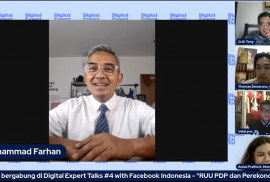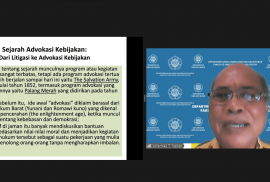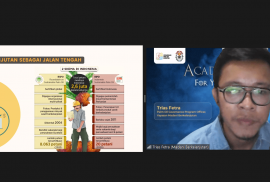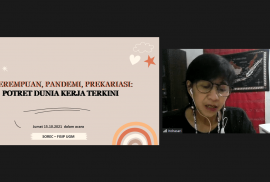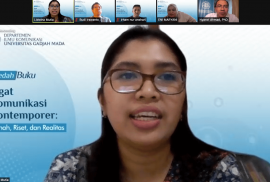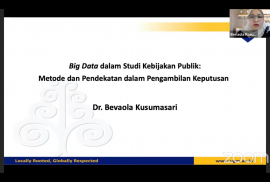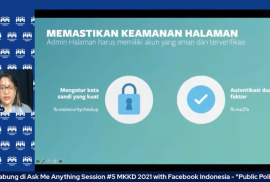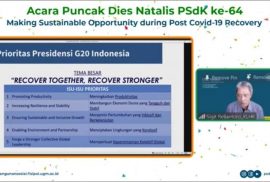Yogyakarta, October 21st 2021─The Center for Digital Society (CfDS) held a Digital Expert Talks #4 talkshow with Facebook Indonesia entitled “PDP Bill and Indonesia’s Digital Economy”. This event discussed the Personal Data Protection Bill (RUU PDP) from the side of the House of Representatives of the Republic of Indonesia (DPR RI), the benefits to be achieved from the ratification of the bill, as well as views from the Financial Services Authority (OJK), the technology industry, and academics. Member of Commission I of the DPR RI, Muhammad Farhan, said that in November, the DPR RI must decide whether the PDP Bill will pass into law or not. According to Farhan, there are a number of challenges in the process of ratifying the PDP Bill. General issues that are being debated in the DPR RI include the definition of personal data and personal data protection, as well as the establishment of a personal data protection authority. “This bill places stakeholders as part of those who have a very big responsibility to protect the interests of consumers or personal data of Indonesian citizens,” said Farhan.
Yogyakarta, October 16th 2021─The Department of Public Policy Management (DMKP) Fisipol UGM held a policy brief training workshop with the title of “Mainstreaming policy brief as a policy-advocacy instrument in developing a culture of research-based social movement”. The event was divided into two sessions in which the first session was filled by Prof Yeremias T Keban with material about the history of policy advocacy and policy brief, policy advocacy theories and important positions of policy brief in policy advocacy, as well as the theory of policy brief creation. Next, the second session was filled by Aldino Niki Mancer, S.I.P as the representative of State Administration Bureau who gave a talk about mainstreaming policy brief and how to use it in policy advocacy in the perspective of bureaucracy and government, as well as the role of policy analyst in policy brief construction as well as advocation. On this occasion, the event was started with a welcoming remark by the Head of the Doctorate Department of MKP Fisipol UGM. The Head of the Doctorate program said that the event started off from a simple idea. This event is a way to give back to the community and was designed to resemble a practical-technocratic training on how to create a policy brief.
Yogyakarta, October 16th 2021─The Student Corps of Governmental Politics (KOMAP) Fisipol UGM collaborated with Politically Aware Generation to hold a workshop of policy making simulation and career sharing session with reputable public policy experts. There were three mentors in the event which were Yoel Yosaphat as a staff at Bandung’s Regional House of Representative, Rian Ernest as PSI politician, Trias Fetra as the palm oil governance program officer from Yayasan Madani Berkelanjutan, and finally Dr. Nanang Indra Kurniawan as a lecturer in DPP Fisipol UGM. The theme of the workshop was the issue of sustainable palm oil in Indonesia. The event that was attended by 60 participants was moderated by Dedek Prayudi as the Executive Director of the Center for Youth and Population Center. Generally, the discussion was about the challenges and opportunities of sustainable palm oil implementation in Indonesia.
Yogyakarta, October 15th 2021─The Social Research Center (SOREC) of FISIPOL UGM in collaboration with the Department of Sociology held an online discussion with the title “Precarization of Vulnerable Workers and Reform of Social Protection Schemes in a Pandemic Period” on (15/10). On this occasion, there were three discussion speakers, namely Indrasari Tjandraningsih, M.A., a lecturer of Parahyangan University, then Lajovi Pratama, a representative of SINDIKASI, and the last speaker A.B Widyanta M.A. as a Lecturer in the Department of Sociology UGM. This event was attended by 21 discussion participants and guided by moderator Rizqyansyah F, Assistant of SOREC FISIPOL UGM. In general, the discussion in this discussion explores the dynamics of vulnerable workers during the pandemic and how alternative solutions to various problems in the precarization or weakening system are. Starting the first session, the event was opened with remarks from the representative of the secretary of SOREC FISIPOL UGM, Gregorius Ragil. In his speech, Ragil expressed his gratitude for the presence of the presenters and participants in this knowledge sharing event. Furthermore, this event is expected to provide new insights that can be reflected and contributed to the community according to our role in everyday life.
Yogyakarta, October 15th 2021─The Department of Public Policy Management (DMKP) of FISIPOL UGM again presented the Young Professional Training and Development Program (TDP) on Friday (15/10). In this second series of TDP, DMKP FISIPOL UGM presented Vidiskiu Fortino Kurniawan as Digital Intelligence Lab Associate at the Center for Digital Society or CfDS to present a material entitled “Google for Research: Looking Trends and Data Mobility”. According to the title, Vidi tries to review ways to maximize the potential of Google, especially Google Trends and Google Mobility, so that it can support research.
Yogyakarta, October 15th 2021─At the end of last September, the lecturers of the Department of Communication Science of UGM published a digital book entitled “The Universe of Contemporary Communication: Fields, Research, and Reality” in order to welcome the 66th Anniversary of the Faculty of Social and Political Sciences of UGM. In order to explore the writings in the book, which can be downloaded for free until last September 25, the Department of Communication Science of UGM also held a book review activity on Friday (15/10). Guided directly by one of the editors of the book “The Universe of Contemporary Communication: The Realm, Research, and Reality”, Lidwina Mutia Sadasri, S.I.P, M.A. This book review event presented four lecturers of the Department of Communication Science of UGM as writers to explain the topics raised in each paper.
Yogyakarta, October 13th 2021─The Department of Management and Public Policy Studies is back with the MKP Book Corner to analyse the “Management and Public Policy Studies Studies Analysis in Indonesia: Asserting Identity and Strengthening Relevancy” through three discussion series. After finishing the first two series last week, on Wednesday and Thursday to be exact, the third series was held on Wednesday (13/10) which also closed the whole series of MKP Book Corner. Using the title of “Contemporary MPP Studies: From Digitalization to Methodology”, the three speakers in the show who were lecturers in the MPP UGM Department talked about the various aspects of digitalization and alternative methods in the management and public policy studies.
Yogyakarta, October 13th 2021─Right now, many technology companies care about the aspects of platform policy. One of them is Facebook who has their own special public policy team to talk about the social impact of technology. The things that the public policy team analyzes also varies, starting from an analysis of platform policy to the issue of privacy. To know more about the role of the public policy team, the Digital Literacy Course 2021 held an event called “Ask Me Anything Session #5: Public Policy and Social Impact of Technology: Building Trust and Community” on last Wednesday (13/10). The event was led by Treviliana Eka Putri as the superintendent of the class and invited Dessy Sukendar, Policy Programs Manager of Facebook indonesia. The Ask Me Anything Session #5 was live streamed through the Youtube of CfDS UGM and Digital Literacy UGM.
Yogyakarta, October 12th 2021─Center for Digital Society (CfDS) FISIPOL UGM held Digital Discussion #56 on Tuesday (12/10) night. The event, titled “Optimizing LinkedIn Accounts for Reaching Your Dream Job”, took place through a Telegram Group. The trigger of the discussion on this occasion was Azzahra Saffira Pradita, founder & CEO of Upgraze Indonesia, moderated by Devia Putri Maharani, CfDS event assistant.
During a pandemic, LinkedIn will be very helpful to find information about careers and self-development safely and quickly. LinkedIn is also touted as a medium for self-promotion to other companies or professionals out there. The presence of LinkedIn makes the job recruitment process faster, more effective, and efficient. In the discussion, Azzahra explained some tips so that LinkedIn accounts can stand out more. “When we manage to get more attention from a good LinkedIn profile it means we have won 1 point in the beginning. The rest is just showing our quality in the next step (how we talk to the recruiter, interview, and offering letter),” he said. First, fill out your LinkedIn profile as detailed and complete as possible, especially the work experience and description sections. Second, enter some keywords that match your profession or skill in the headline column. Third, add as many connections as possible.
Yogyakarta, October 9th 2021─PSdK’s 64th dies natalis celebration ended with a webinar session titled “Making Sustainable Opportunity during Post Covid-19 Recover” on Saturday (09/10). The event was attended by Sigit Reliantoro, M.Sc. as the Plt. Director General of Pollution Control and Environmental Damage and Forestry of the Republic of Indonesia, who gave the keynote speech to open the webinar. The webinar also invited five speakers which are Prof. Dr. H.Nelson Pomalingo as the Regent of Gorontalo; Yudi Nugraha as the Manager Relation of Pertamina Subholding Upstream Regional 1 Sumatera; Dina Mariana, M. H. as the representative of a senior researcher in the Research and Empowerment Institute; and two PSdK lecturers which are Bahrudin, Ph. D. and Milda L. Pinem, Ph.D. The webinar was done via zoom and youtube. Generally, the talk was about the opportunities for sustainable development during the covid-19 recovery period in Indonesia.

